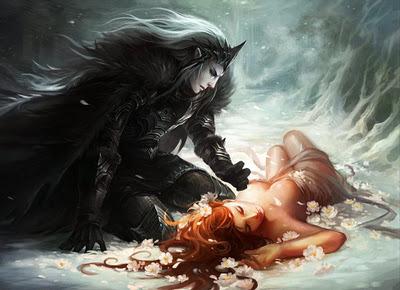Jennifer Freitag's Blog, page 40
February 6, 2012
You Got Burn'd
 "Wilt thou egg me on so much?" said Juss.
"Wilt thou egg me on so much?" said Juss."Ay," said Brandoch Daha, "if thou wilt be assish."
The Worm Ouroboros
Having given it some thought, I am willing to admit that languages not only grow but, like snakes, shed lengthy carcasses of dead skin and leave that skin behind as they move on. And I am willing to admit the futility of trying to go back to a time in the past and live it out, word for word, definition for definition. This will make you absurd, irrelevant, and universally misunderstood. Words move on. Words die. Words are born. But neither do I subscribe to pessimism or fatalism or nihilism. There are some words that ought not be given up. There are words which, though of past ages, give a renewing spice to current ones. There are concepts of reality that have built higher than even Babel could reach, and need, therefore, new terms to define them. If I might be so bold to say, a good writer can bring out of his storehouses words both old and new.
I said once that a writer and a reader is caught up in a sort of unspoken conversation which stretches across all of history (we have but the mute charades of prehistory, and they say nothing), and I had the delight of being privy to such a war for words as made me laugh on several accounts, on accounts not merely that of diction. Upon hearing that some of his poetry had been written off by a critic as containing an abundance of "obscure language" and "imperfect grammar," Robert Burns replied with the following letter.
Dear Sir:
Thou eunuch of language; thou Englishman, who never was south the Tweed; thou servile echo of fashionable barbarisms; thou quack, vending the nostrums of empirical elocution; thou marriage-maker between vowels and consonants, on the Gretna-green of caprice; thou cobler, botching the flimsy socks of bombast oratory; thou blacksmith, hammering the rivets of absurdity; thou butcher, embruing thy hands in the bowels of orthography; thou arch-heretic in pronunciation; thou pitch-pipe of affected emphasis; thou carpenter, mortising the awkward joints of jarring sentences; thou squeaking dissonance of cadence; thou pimp of gender; thou Lyon Herald to silly etymology; thou antipode of grammar; thou executioner of construction; thou brood of the speech-distracting builders of the Tower of Babel; thou lingual confusion worse confounded; thou scape-gallows from the land of syntax; thou scavenger of mood and tense; thou murderous accoucheur of infant learning; thou ignis fatuus, misleading the steps of benighted ignorance; thou pickle-herring in the puppet-show of nonsense; thou faithful recorder of barbarous idiom; thou persecutor of syllabication; thou baleful meteor, foretelling and facilitating the rapid approach of Nox and Erebus.
(signed) R.B.
To know half the vocabulary in this little letter (which I'm relieved to say I do), to have half the wit in wielding it (which I'm ashamed to say I do not), would be a thing of game skill and humour. What an art! what an art, which we must not let die.
Hail, Robbie Burns. We salute thee.
Published on February 06, 2012 13:52
February 4, 2012
Here It Is...
 ...the moment you've been waiting for! The New Year Writing Contest for The Penslayer and Scribbles and Inkstains has come to a close. We had gobs of beautiful entries and we had difficulty picking only one to take the cake and only one to be second-place.
...the moment you've been waiting for! The New Year Writing Contest for The Penslayer and Scribbles and Inkstains has come to a close. We had gobs of beautiful entries and we had difficulty picking only one to take the cake and only one to be second-place.the ice cream: sky-glory (Yaasha)
"What is it?" Aron covered his eyes with both hands. The image of it still burned in his eyelids, shooting pain through his head. It was delicate, like a butterfly's wings or a column of smoke, yet in the delicacy lay perfect design and order, which indicated a strange resilience. It appeared to be formed of several strands, each with its own quality, each lending its unique radiance to the whole. Like hair, Aron thought.
He dared a glance between his lashes, trembling, and the pain seemed to explode behind his eyes, but he could not look away. In a way, even the pain accentuated its beauty, proving that it was more than a fragile apparition. And its size! It filled his vision, one side licking the dark river that flowed to Aron's right and the other touching the clear purple mountains in the distance on his left. The entire sky seemed to blaze with its glory and to brush the bottom of the rainclouds with many colors.
"What is it?" Aron asked again, clutching his sister's hand.
Nura stood, transfixed and breathless for a moment, then whispered reverently, "It is a rainbow."
The delicious ice cream side to our writing contest was this piece by Yaasha, sporting a breath-taking new look at rainbows that was, for Abigail and me, completely unexpected. Thank you, Yaasha! I will never look at a rainbow quite the same way again.
* * * * *
the cake: time (Alex)
I know who you are.
It took me a while to figure it out, but now I know. When we first met, you came into our house, to see my father. He was drunk again. You stole his wealth, you stole his reputation, and you stole his kindness, and eventually you stole his life. I didn't cry, because you had stolen my family's affection for him, too.
You were a strange looking man, very old and yet very young, dressed in garb from about every era and every culture that there has ever been. I counted at least ten pocket watches and thirteen wrist watches, so I could hear a distinct ticking sound whenever I went near you.
You turned to leave, but you said you would be back one day, and that we'd better be careful about what we allow you to take. I asked what your name was.
"In time, you will come to know it," you said.
Those words puzzled me at first, but now I know your name was hidden in your words all the while. I know who you are.
You are Time. And I'll be ready for the next time you come to call.
This one took the cake and made off to Wonderland with it. Alex's piece is both fascinating and eerie, and one of the rare occasions Abigail and I have seen second-person employed so poignantly. Chilling, Alex, very chilling, and also beautifully defiant. We enjoyed this one immensely.
* * * * *
Huzzah to you both, girls! Heraldic emails await you both to make sure you get the happy news and remind you of the prizes. And thank you, all who entered. This was a treat for Abigail and myself and we hope to do it again someday. Meanwhile, keep up the scribbling! May your pens never lack for ink nor your imaginations for light.
Published on February 04, 2012 10:44
February 1, 2012
Words Run Like Greyhounds
 "I will speak daggers to her, but use none."
"I will speak daggers to her, but use none."Hamlet
I have had a very busy, rainy day with very little scribbling and gobs of reading. Honestly, between Chesterton and The Golden Warrior and a years-belated reread of The Golden Goblet (which was unexpected but not unpleasant) I don't think I did much else today besides a walk and three cups of tea. Three cups is highly unusual. Don't judge me.
But to keep wayward scribblers like myself in line Katie has graciously taken it into her head to host a monthly snippets bout. "Snippets" sound to me a lot like "whippets," which in turn remind me of greyhounds, so the following is a pack of words which I have written and wouldn't they just love to break lead and get away from me and hunt down your imaginations!
February Snip-Whippets
With an upward rush of his arms, a ring somewhere among his fingers glinting like starfire, his voice suddenly became like thunder, like power, and it stung Margaret horribly. "Welcome the Hollow Moons, my friends! Welcome the Hollow Moons!"
And the room gave back the cry, "God rest the Hollow Moons! God rest the year!"
Plenilune
"For being flagrantly unsociable," mused Rupert, "he can deliver a stirring speech when the occasion requires it."
Plenilune
...before she could resist against her better judgment, or do anything rash, she was pulled in by Rupert and they were striding out into the middle of the room while the crowd and music whirled like compass-needles around them.
Plenilune
[Mark Roy]turned his head away and looked after the baron, his own face clouded by thoughts, the muffled sound of thunder in the lift of his shoulders and the gold-traced dragons that were depicted there.
Plenilune
In the dark wings of the north end of the ballroom the players sat, tiered on their benches, like a jury of angels. They were all in warm, dark colours and seemed to melt into the shadows, illumined only by their single candles. It was a strange, eerie thing to sit just below them, looking up into their shadows, while it seemed the candles, not their fingers, played the light upon the strings. It was a strange, eerie note they played, a minor key which seemed to conjure the formless, painful longing in her soul and give it a kind of voice. Margaret sat in her seat, her hands gripping the arms of it until her knuckles turned white, and suffered the mournful song to wash out of the high dark down over her.
Plenilune
"Rhea," he purred at last, a panther-smile curling on his face. "Mine own familiar Rhea, who starved me and took all the light out of my world, what does she here? She knows her cunning and beauty. What need has she of a lookinglass?"
Plenilune
It was not like a reaper's sickle, it was like the sickle-curve of ocean sweeping at her, for her, to overwhelm her and her alone—as if no other soul but hers was meant to soil that inexorable blade. Her eyes fell shut against the impact.
God, take my soul. I dare not die without thee.
Plenilune
"Really?" Centurion raised a brow. "The game moves on apace."
Plenilune
Published on February 01, 2012 14:19
January 29, 2012
Beautiful People - Lord FitzDraco
 "Three riders there are in all Plenilune none other man born of woman can match—Lord FitzDraco of Orzelon-gang, my own Lord Skander Rime, and Dammerung War-wolf."
"Three riders there are in all Plenilune none other man born of woman can match—Lord FitzDraco of Orzelon-gang, my own Lord Skander Rime, and Dammerung War-wolf."Plenilune
I already did a Beautiful People post for January, but I have done multiples before and I will undoubtedly do multiples again. There aren't any rules about that kind of thing and I should like to dig about in this gentleman's character a little and get to know him better, for he is "flagrantly unsociable" and isn't easy to know. Hmph.
Before all that, here's a reminder that we're coming up on the end of The New Year Writing Contest for The Penslayer and Scribbles and Inkstains. Rules (and prizes!) can be found on the contest's page. If you feel like joining, you still have time before the end of the month to brainstorm and scribble!
Lord FitzDraco of Orzelon-gang
1. If his house burned down and he was left with nothing but the clothes on his back, what would he do? Where would he go?
Lord FitzDraco makes for a grim master, but a good one. If his house at Gemeren (which he holds in fief to his king Mark Roy) were to burn down, a good part of the burning would be spent getting people and things out. Because he is a knight of the king he would seek residence and succour (and get it) at Orzelon-gang, but the journey would be spent in a kind of private agony over the loss of the house he had built and the difficulty of finding lodgings for his people and making sure they were cared for.
2. Is he happy with where he is in life, or would he like to move on?
Happy is not a word one could use for FitzDraco. His natural demeanour is grim, his preference solitude. He is not frequently moved to either happiness or anger; his emotions can best be described as a steadfast monotone of contentment and loyalty, loathing and hatred, depending on who is the recipient of these emotions.
He holds a fine manor at Gemeren, built by himself and named after his father; his people are unquestionably loyal to him, and he is the king's closest friend. He is perfectly content with his position—though, even without all this, I fancy he would be unmoved by fears of future or desires for betterment. He does not merely take life in stride: he stands unmoved.
3. Is he well-paid?
He has no wants, that is certain. His manor largely sustains itself and brings in a good profit by trade, his king is very generous, and from his own conquests and those of his father the spoil of war is always rich in Gemeren.
4. Can he read?
Yes, oh yes. FitzDraco is a wolfish reader: he positively devours books, though without the slightest ruffle in countenance either for or against the content. The library at Gemeren is very extensive. I shudder and my head fairly turns to think of the tomes he has read—and understood—and retained. I think he must remember everything his reads, though one of his faults is being miser-like with it all. He very rarely divulges his accumulated knowledge to anyone. But I don't think he does it out of spite, so perhaps I forgive him. I probably wouldn't understand him anyway if he did try to tell me.
5. What languages does he speak?
Only his own with any luck, and that very rarely. Though Mark Roy looks to him for guidance and council, you are hard-pressed to find the man putting more than four words together in a conversation, and hard-pressed to find him putting more than four conversations together in a day.
6. What is his biggest mistake?
I don't know what he thinks is his biggest mistake, but a fair lot of people think it was an unwise move of his to take a woman by hand-bond, and that from among a lower class. Herluin is a good woman, and as much a lady as any born among the nobility, but the fact of the matter is that she is not nobility and, though they probably wouldn't shun her, they consider it unorthodox, and she and her husband choose for her to stay quietly at Gemeren overseeing the manor.
7. What did he play with most as a child?
FitzDraco is the sort of fellow you don't consider as ever being a child. He seems at first glance to have always been older, with grey hairs among the brown at his temples and the cares of years in his eyes and at the corners of his mouth. He grew up at Gemeren and worked more than he played, and his play often looked like work. For all his grim, unruffled demeanour, he is a very driven soul, bound and determined to be circumspect and blameless before his people, his king, and his God. So nothing that he did ever looked much like play.
8. What are his thoughts on politics?
He is Mark Roy's man to the last. You never have to worry about his loyalty, you never have to worry about him being discreet (he hardly ever speaks anyway). He is foremostly a council for his king, secondly a sword at his king's side. As for the question of Overlord, he knows who he does not want, but looking round has yet to see a man he trusts can fill the role to step forward.
9. What is his expected lifetime?
I would expect FitzDraco to live a long, full life and die a warrior to have his body carried back to Gemeren and buried under the elms. Anything can happen in a fight, and no man going into one thinks he will come out again to see tomorrow (though he will hope it with bravado), but FitzDraco is renowned enough in war that he has a good chance of seeing many days before a chance spear sees him.
10. If he were falsely accused of murder, what would he do? How would he react?
If he were accused of murder, FitzDraco is the sort of man you could almost believe could have done it—but the next moment after you could be sure he had not. Because the man has no reactions to anything his countenance would be the same, and I dare say such a cat's grim stare would knock a person out of sorts after a few unblinking minutes. Besides, one should have a care of accusing people who are the right-hand of a king. One might start a war.
"Quite," he said.
Published on January 29, 2012 05:40
January 23, 2012
"No Lace!"
 "No lace, Mrs. Bennet, I beg you!"
"No lace, Mrs. Bennet, I beg you!"I blame this bit of fun on Rachel. A lot of my blogging fun can be blamed on Rachel. I don't know how she feels about that. I dare say in a year or two she'll have got over it tolerably. For her story The Scarlet-Gypsy Song she charted out clothing styles, as her story is a fantasy set in another world. I know that makes it sound terribly cliche, but her story has a lovely quirk and twist to it which gives it a fresh dimension. Abigail did this sort of post likewise in "Let Us Be Elegant or Die," and while I am pretty poor sport at coming up with original clothing, I thought I, too, might regale you with the trendy fashions of Plenilune. My post from last August, "What a Deal of Starch!", gives you a peek into my general views on clothing. Now I want to be specific and (Megan) alleviate a tiny bit of the mystery that seems to surround Plenilune.
The woman sat foremost among those in the orchestra, and in her pomp and quiet, smothering splendour, Margaret knew she was only gracing their company: she belonged among the lords and ladies. Her hair was caught up with pins of blue amber—which the light behind her was making into a furious cluster of fractalled flame—but if it had been let down it would have been long and tawny-striped like honey and a tiger's coat, and Margaret almost hated her for the beauty of it. She was in a gown of peacock-blue, the same colour as the drenched night blue outside the windows, and her gown was chased over and over very heavily by gold threads, as if the golden harp-strings of her instrument were tied to her, and she to it—and when she glanced up across the audience from attending to her harp and the light of the chandeliers illumined the look in her eyes, Margaret was certain of it.
Plenilune
Throughout the different Honours of Plenilune and the varying tastes of peoples and individuals, there is one common element. The society of Plenilune likes to put on a show. They breathe heavily with pomp and splendour, colour, jewels, metals. They like to look good. Even FitzDraco of Orzelon-gang, whose most lavish colour is a hunter green, sports a heavy ring with an equally heavy aquamarine stone which (legend has it, and he has not stirred himself to debunk the legend) will turn hot-white when the wearer is righteous in fury. Even those who wear black as a habit (and there are a few), they have a way of wearing black as if they wore the very void of the universe. No matter what they wear, they wear it with style.
They like velvet. Nothing purrs quite like velvet. It can be light or heavy, solid or printed, and it has just the amount of easy pretension the Plenilune elite like to wear. This is ideal for late autumn, winter, and early spring, of course, but you can wear it in the warmer months if it is handled delicately. Furs too, furs are a splendid accessory - horsehair and fawnskin are very light and typically worn by the ladies, panther-skins are very rare and greatly admired. You are not likely to find any English floral prints in the crowd: Plenilune prints tend to be heavily organic, particularly those influenced by the nomadic antipodes, which take embroidery and brocade to a whole new level of intricate. They are almost alarmingly lackadaisical about where normal people put gems and will set them in almost anything, so long as the setting is grand enough for the jewel. Their love of bold colours is rivalled only by the nomadic peoples, who don't believe in darkening or muting and aren't the best judges of which colours ought to go together, and which oughtn't. Plenilune society may love its overwhelming show, but it is always classy about it.
And throw in some feathers! - in a lady's hair, on a lady's dress, on a masque, on the cord of a doublet-tie - make a peacock jealous! Swan, grouse, pheasant, raven, blue-jay, cardinal - anything with a plumage to show will be plucked and wind up sported at a Plenilune social gathering. Conversely, they may be particular about their cloths, but they aren't selective about their gems. If it cuts well and throws a good shine, they don't mind if it is "precious" or not.
This is all very minute. In general Plenilune style could be described as medieval hurled very hard at Victorian, and Victorian coming out the worse for it. You will not spot pantaloons anywhere (thank goodness), but trousers, though you will find variations of the doublet used with extreme flippancy. Dresses tend to be close-fitting and layered under the skirts; necklines vary with taste. Buttoned coats are not uncommon, especially among hunting paraphernalia. Hats are, however, almost unheard-of. Hoods are used for inclement weather and a woman might wrap a light shawl over her head, but it is a mark of dignity (among those who care to think about it this deeply) to go about bare-headed. And something they all wear, which cannot be cut out of stone or cloth, is that sense of dignity, of potency, of splendour and the splendour of humanity of which their heavy embroidery and rich clothing are only the bare fringes.
When I said it was like a crazy tapestry of colour and action, I was not joking. It is a giddy business, trying to write all this, and not unlike inducing a constant fever in my brain and vision. What a people to be hurled among after living twenty years in anemic, industrial, Victorian England!
She could not remember England very well, though that might have been only because her vision was running riot with whirling colours, peacocks' feathers, light, movement, and music. All she could remember was a broken sense of hoary discontentment, a sense of living drudgery, of fighting against small, insignificant shadows of things—when here in Plenilune lived and walked the sharp-edged real things of a higher plane: the gods and demons in their palaces, dancing together on the eve of winter.
Plenilune
Published on January 23, 2012 15:06
January 21, 2012
Beautiful People - Margaret Coventry
Published on January 21, 2012 14:38
January 17, 2012
I Always Mistrusted His Appearance of Goodness
 "Whosoever is overcome of desire and turns his gaze upon the darkness, he shall look on hell
"Whosoever is overcome of desire and turns his gaze upon the darkness, he shall look on helland lose the thing he loves."
After a brief discussion between my sister and me, Abigail wrote down a good post on romance in literature. I highly recommend it, because it bears considering, and I will only summarize it by saying that she holds (as the evidence supports) that romance can be written wrongly, but that there is no one right way to do it. But let her post speak for itself. In light of that brief discussion, her post, and my own novel, we thought I ought to write a companion post on the wrong sort of romance.
Don't misunderstand me. Abigail handled romance being written right and romance being written wrong. I want to wrestle with the beast of writing, not Romance Wrong, but Wrong Romance. We are all familiar with the girl who makes some bad calls and falls for the wrong sorts of men - we hope that, in the course of the story, she learns from her mistakes and finds a good bloke to look after her. But just as it is important to know how to write villains convincingly, flesh-and-bloodly, it is important to know how to write those bad calls, those wrong romances.
Two examples came to my mind, both of them very similar. In fact, it was this idea that brought the similarity to my attention. Those examples are my own heroine and antagonist (not very well known to you just yet) and the famous example of Hades and Persephone. Now, there was a match made in hell if ever there was one. You'll find the story of the kidnapped princess everywhere, of course, but Hades is really master of them all. Riding in his chariot pulled by his fell black horses, he comes upon the flower goddess wandering a little too far from home. In one swoop he grabs her by the wrist and hauls her into his car, whips up the horses, and plunges irreparably back into his abysmal realm. It's a well-known story. But they tell me familiarity breeds contempt, and it has been such a very long time since those black horses pricked through the meadow, leaving dead flowers in their wake, that the whole story doesn't really catch us by the throat anymore. We know how it ends, even if we hate Hades for doing it. It's boring. It has no dimension anymore, warped out of life by the sheer volume of time that lies between it and us.
So how, without violating moral laws that we all hold to be self-evident, do you catch your reader by the throat? How do you write such a persistent, unswerving, inexorable passion on the part of the antagonist, or the heroine fighting him every step and turn of the way? How do you make Hades and Persephone (who only wept, stupid woman; I would have kicked and bitten him on that downward drive) - how do you make Hades and Persephone real?
You're not allowed to be missish. My antagonist really does love the heroine, but in a twisted, dark, self-centred kind of way that shows a horrible kind of mercy and a hard kind of tenderness. Just as a villain won't consciously think "I am going to do this because I think it is wrong," just so a passionate antagonist will not try to woo a woman just to hurt her. Somehow, in some confused, fallen, violent way, there is something like attraction and love in the antagonist. And it is when something good is so totally warped out of decency that it really jolts you. Margaret and her suitor, far more than Hades and Persephone, make you fear for life and limb and light because the suitor stands closer to the attention than distant mythical gods, and he really means business.
You all know how to write good characters. You know how to give them dimension, depth, purpose. You know how to make a really good hero and a really good villain. But I'm throwing another ball into the cricket match (because doesn't this all defy explanation?), and that is the depraved romance. That, too, is a fact, and that, too, as with everything else, is something we ought to be able to handle well. And to make it come alive, this often necessitates a dangerous journey into very abysmal realms of the heart. What drives the antagonist, and how much will he risk to get what he wants? How strong is the heroine, and what can she take before she begins to crack? Once you start pumping life-blood back into such stories as kidnapping, manipulation, dark, hell-bent affection, the long perspective of Hades and Persephone begins to grow some dimension - and begins to be frightening again.
That is a dour note to end on, don't you think? Even the pagan story, which was more concerned about the fact that Demeter had shut off spring and summer, didn't end there. If you ever find the need to write such a romance I am sure your motives and methods will be different. But I do hope that there is one thing similar: I hope there is a white knight with the motto tertium quid stamped on his shield to bring in the right sort of romance. But though the right romance should be that much better, and is that much more important to be sure, make sure the wrong sort doesn't suffer from missishness or neglect.
[She] laughed softly, bitterly. "You are fit to be a king," she said, lifting her eyes to his. "But you would be a tyrant."
Plenilune
Published on January 17, 2012 06:44
January 15, 2012
As My Whimsy Takes Me
 Sky and Georgie and Finvarra have been hosting a giveaway on their blogs for the past week or so and have posted several writing-related questions on their blogs. I don't intend to enter the giveaway because I'm not much of a contest person (thus improving others' chances of winning). But the questions looked like they would be fun to answer anyway and, as I am not in a position to tell you any updates on Plenilune but would still like to keep you all informed as to my movements, I thought I would yoink the questions and answer them for the mere whimsy of the thing.
Sky and Georgie and Finvarra have been hosting a giveaway on their blogs for the past week or so and have posted several writing-related questions on their blogs. I don't intend to enter the giveaway because I'm not much of a contest person (thus improving others' chances of winning). But the questions looked like they would be fun to answer anyway and, as I am not in a position to tell you any updates on Plenilune but would still like to keep you all informed as to my movements, I thought I would yoink the questions and answer them for the mere whimsy of the thing.Which author do you aspire to be like?
Well, myself. Naturally, I suppose I will be like other authors - Sutcliff among the foremost of these. If a writer is worth his ink he will not be too proud to take lessons from others. There is a kind of constant conversation going on between authors across all ages, an unspoken conversation, which covers reams of pages and numerous languages. I am a part of that conversation, but though I am perfectly willing to listen to the voices of others wiser than myself, I hope my voice will always be my own.
If you could meet any author from any time period, who would it be?
Oddly enough, it would probably be Jane Austen. I say 'oddly enough' because she is not my favourite author, but I somehow think she and I would get along more companionably than other authors I read. I feel as though we could talk about more than merely writing (which gets dull after awhile), and perhaps converse on more humane things, like clothing and the smell of books and the state of the social mind. I have a vague idea which might, if allowed to be a reality, be detrimental to me, and that is to get all the Inklings together (honorary et al) and be allowed to listen to their discussions. I fear for myself, however, because I rather think Chesterton would accidentally kill me with one of his violently excited gestures in the middle of a particularly heated speech.
Who is your favourite literary character, and why?
To answer self-centredly, I might have to say Rhodri. I have never written a character I liked so well as he, and though he is my own character I think plenty of people understand well enough the independent existence of characters to allow me to be that fond of a character I made. Less self-centredly, and in, perhaps, the true spirit of this question, the answer to date would probably be Tiberius Lucius Justinianus - Justin for short - and Marcellus Flavius Aquila, because the two are one and the same in everything. Yes, I dare say the hero-cousins of The Silver Branch are probably still, after all the books I have read, my dearest and most familiar literary characters.
There was a golden aura about Eikin where he sat in the last patch of light, but Rhodri had not moved in all the time they had been sitting, and there was a faint greenish hue in the shadow where he sat, his wings limp about himself. He had his arms crossed over his chest and his head back, and he seemed to be asleep. It was strange, Adamant reflected, gazing at him, how ill at ease he could appear,
even when he was unconscious.
Adamantine
As for why, that is a difficult - almost an impossible question to answer with any adequacy. For Rhodri, I fear I would give too much of his story away. And besides, Rhodri is not an easy man to know. He does not make himself an easy man to know. There is a moody grey mystery and dependability about him, but that is hardly a satisfactory summation of him. As for Justin and Flavius, they too describe themselves best by their own actions, their dual quietude, loyal nature, fire and determination. To describe them would make me sound sentimental, and them like pieces of poetry. But if anything is worthy of high sentiment or worth being the subject of poetry, I suppose true men must be. Funny odd thing, isn't it, how those men who are closest to the long-lived, elemental patriarchs of our race are those which words fail to describe...?
'So. It is good,' Constantius said. He looked from one to the other. 'I am told that you two are kinsmen; but I think you are also friends, which is a greater thing. Indeed, that was told me by the Primus Pilus here. Therefore I hope you may not be ill satisfied to find yourselves once again posted together.'
The Silver Branch
I am told, by people who were closer to the beginning of the world than I, that Atlas was in the habit of holding the world up on his shoulders. My giddy Athena! I have worlds in my head! I think the Titan, child of those patriarchs though he may have been, has nothing to boast about.
Published on January 15, 2012 13:53
January 10, 2012
One Thousand Disappointments
 The worth and excellency of a soul is to be measured
The worth and excellency of a soul is to be measuredby the object of its love.
The Life of God in the Soul of Man, Henry Scougal
For some time now I have seen the exercise about called "One Thousand Gifts." I know my mother has the book. At least, I assume she has the book. I have seen it floating about her house, so naturally I deduce that she owns it. I have not read the book nor do I follow the lady's blog who first instituted this exercise, but I understand that it is to help believers recall the small mosaic-piece graces that God infuses into our lives every day. Now I am sitting here listening to Audrey Assad's song "Show Me" and Laura Story's "Blessings" (songs that, I think, are well-known) and my thoughts are running in the other direction. I am not going to write a book about this or start a challenge because I think my thoughts don't deserve that level of attention, but I hope that, in conjunction with the "One Thousand Gifts," these thoughts might also be helpful.
we pray for blessings, we pray for peace
comfort for family, protection while we sleep
we pray for healing, for prosperity
we pray for your mighty hand to ease our suffering
and all the while you hear each spoken need
yet love us way too much to give us lesser things
It is always very moving in the Scriptures when someone has waited long and long and begged hard for the Almighty to grant a request to get what they desire. What comes to mind especially are those who longed for a child: Abraham, Hannah, Elizabeth, among a few. Leah, too, though she did not wait long for her answer: she received a double portion of a blessing of children. It always moves me to see God's gracious hand work this way. He made a way for the righteous through the flood, he heard Abraham on Lot's behalf, he raised up Ruth and put her in the lineage of Christ. So many blessings to see, they choke me with emotion because the image that they produce is that of a just, gracious, merciful God whose heart is bent especially to the widow, the orphan, and the alien.
'cause what if your blessings come through raindrops
what if your healing comes through tears
what if a thousand sleepless nights are what it takes to know you're near
what if trials of this life are your mercies in disguise
But I think I am moved even more so in the narratives when God says no. When he shuts up the Garden, when he refuses Ishmael, when he does not heed David's plea, when he refuses any more petitions for Israel, when he does not grant relief to Paul. It is very easy for us to remember God as benevolent toward his children, full of grace and mercy, because he is. But I think we get an uneven view of his nature when we focus only on the gifts. What about the things he has refused us? All is his to give or to take, to bestow or to withhold. Are we not told as much about him by what he does not give as with what he does? What was it that he told Paul? "No - but my grace is sufficient for you." Sometimes his refusals are more poignant than the gifts because they force us to look beyond what we ask for to the reason in the Divine Mind. If not what we ask, then what? If not our will, then whose?
what if my greatest disappointments
or the aching of this life
is a revealing of a greater thirst this world can't satisfy
what if trials of this life
the rain, the storm, the hardest nights
are your mercies in disguise
He gives graces lavishly, and it is in his nature to be gracious, but he does not give contrary to his just nature. This is not to say that all refusals preclude some sin on the part of the asking believer: was it wrong of Paul to ask the Almighty for relief? Well, perhaps that is between Paul and the Almighty. But there was a deeper lesson to be learned there: that God's grace is abundant and sufficient to be drawn from for the present distress.
you could raise me like a banner in a battle
put victory like a fire behind my shining eyes
I would drift like falling snow over the embers
but for now, just let me lie
This is a lesson that has warmed the hearts of believers time out of mind. It is not an easy lesson to learn and, unlike "your Father knows what you have need of before you ask," it is a lesson that must often be taught again and again, to each and every Kingdom-citizen. Mark what you are not given as well as what you are, and see how both attest to the person of our Lord and his dealings with his people. Whether or not it is a comfort, I do not know, but I recall Jesus himself wrestling with the horror that lay before him, asking if it might pass from him, and saying all the same: "Not my will, but Thine be done."
bind up these broken bones
mercy, bend and breathe me back to life
but not before you show me how to die
Published on January 10, 2012 05:24
January 9, 2012
Time Seems Relative, and Dual
 when owls call the breathless moon
when owls call the breathless moonin the blue veil of the night
when shadows of the trees appear
amidst the lantern's light
the sounds of the birds seem to fill the wood
and when the fiddler plays
all their voices can be heard
long past their woodland days
"mummer's dance," loreena mckennitt
It happened to me for the first time last spring, nearly summer, which made it all the more ridiculous. I was on a walk in the swimming buttery heat, which really should have helped my sense of reality, but evidently the psychological impact of my writing is more than skin-deep. That was back when I was seriously ploughing through editing Adamantine and, as tends to happen in the due course of seasons, it was winter (or very nearly) in the story, and as I was walking up a particularly warm street it dawned on me that I had, unconsciously and otherwise happily, assumed that the season physically around me was winter too. It took me a moment of serious reasoning to convince myself that it was spring-almost-summer not autumn-almost-winter.
Oddly enough, I took this as a good sign. I had become so wrapt in my work that it had, to a small degree, ceased to be a manuscript and had become a world into which I plunged daily, interacting with and guiding the characters - a world which dragged backwash with me when I returned to this realm. The nursery magic had turned it Real. It was an odd, pleasant discovery.
Now I am working on Plenilune, a story closely tied to the turning seasons. As I am working on the first draft this mental quirk is not so liable to happen, but on occasion I do find myself wrestling with January and November, trying to figure out which one belongs Here and which one belongs There and which one it Really Is Now. There is no hope of my catching up to the Real Month, so I expect this fight will continue until I slowly succumb to my story's view of things. It is not really helped much by the fact that the middle of January Here is feeling a lot like the middle of November There.
One could get a lot of birthdays out of this, I dare say: real ones and literary ones. But I somehow doubt anyone would fall for that.
"Time enough for sharp swords and bright spears when the cherries put on their gala gowns.
Winter is an hour of high fires and warm company."
Plenilune
Published on January 09, 2012 08:13




